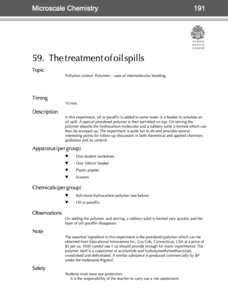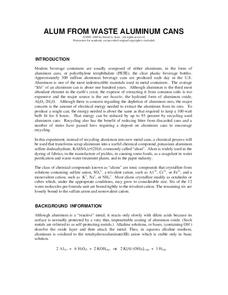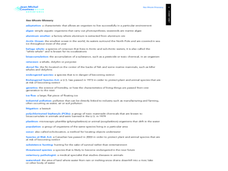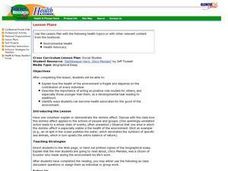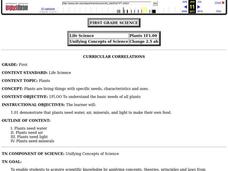Curated OER
Down in the Dumps
After an introduction to municipal sludge, middle school ecologists consider the pros and cons of dumping in the Hudson River Canyon. The class is split into two groups: one to debate in favor or dumping and one to debate against the...
National Institute of Open Schooling
Heavy Metal Contamination
An informative lesson focuses on heavy metal contamination of environments. Classes read about, discuss, and answer questions pertaining to sources of heavy metals in the environment. To finish the 35th installment of 36, individuals...
Royal Society of Chemistry
The Treatment of Oil Spills—Microscale Chemistry
When oil spills happen, how is the oil cleaned up? Pupils of polymer science discover an amazing substance that turns oil into a solid during a microscale experiment. Individuals observe oil or paraffin before and after addition of the...
Orange County Water Atlas
Location, Location, Location…
Young geographers discover not only how to read and recognize coordinates on a map, but also gain a deeper understanding of latitude and longitude and how climate changes can vary significantly across latitudes.
University of Connecticut
Building Your Own Biosphere
On September 26, 1991, four women and four men entered the scientific experiment, Biosphere 2; the doors were sealed for two years in order to study the interactions of a biosphere. In the activity, scholars explore biospheres by...
Chymist
Alum from Waste Aluminum Cans
Turn aluminum cans into pickles! An engaging experiment has learners chemically change aluminum into a substance with many purposes including the manufacture of pickles. After performing the chemical conversion, the experimenters verify...
NOAA
Through Robot Eyes
How do robots assist ocean explorers in collecting data and images? The final installment in a five-part series has science scholars examine underwater images collected by robots and identify the organisms shown. Groups then calculate...
Poetry Class
Tackling Climate Change
Get your kids thinking about climate change with a series of activities that include creating a ditty box poem for the planet, a poem that identifies concepts or objects they would want to preserve.
Consumers Energy
The Cost of Electricity
How much is your toaster costing you every day? Young environmentalists calculate the monetary costs of household appliances based on their average consumption of wattage.
Cornell University
Weed IPM
Go on a weed hunt! Scholars gain insight into the characteristics of plants and examine the outdoor environment in order to identify five different types of weeds. Learners then show what they know with a one-page reflection.
Purdue University
Food Waste and the Environment
Out of sight out of mind can be a dangerous habit. Learners investigate the life of food waste after it leaves people's homes and its impact on the environment. They complete a series of three activities that involve building a mini...
Curated OER
Quality of Rice
Sixth graders research how farmers irrigate, harvest, and keep high standards of rice. In this farming lesson, 6th graders discover how rice, wheat and soy beans are farmed. Students make a chart showing the similiarities and differences.
Curated OER
Echinoderms
In this echinoderm worksheet, students will explore the characteristics of echinoderms including their body structures and larval stages. Then students will match the five classes of echinoderms to their descriptions. This worksheet has...
Curated OER
Beluga Balancing Act
Students study beluga whale populations and the issues they face. In this beluga lesson students compare the issues that the whales are facing and name ways people can help.
Curated OER
Where's The Drip?
Students explore the school and report back any leaks they see to the teacher. They are encouraged to do this at home and report any leaks to their parents.
Curated OER
How Much Azatrine?
Learners understand the connections among people, places, and environments in the local school and community, Kansas and its surrounding states, the U.S. and its region, and the world.
Curated OER
Biographical Essay
Tenth graders explore the importance of the environment and ow fragile it is.
Curated OER
Plants
First graders explore the specific needs, characteristics, and uses of plants. They discuss the needs of plants as they grow. Students observe plants in various settings as they grow and note the changes they see.
Curated OER
Making Recycled Paper
Students explore the advantages of recycling paper. In this environmental lesson, students produce recycled paper by ripping up paper and putting it into a blender with water to create a mixture. Students use their recycled paper to...
Curated OER
Oil Spill Solutions
Students build a system to remove oil from a water source. In this environmental engineering instructional activity, students plan and build a system to contain and remove oil from a water source using various materials provided by the...
Curated OER
Sand, Sand, Everywhere Sand
Students study the physical characteristics of four types of desert regions. In this desert regions lesson, students watch a video about deserts and discuss the deserts. Students compare the deserts and research the ways humans have...
Curated OER
Power In Variety
Students discover different types of energy. In this energy source lesson students compare different types of energy, renewable and nonrenewable. Students answer questions about the different types of energy and their impact on the...
Curated OER
Hot Zones
Students trace the presence of water-borne diseases to environmental conditions caused by humans. They describe how these diseases affect people in the developed world. They discuss possible solutions as well.
Curated OER
Dirty Decomposers
Students explore the ecosystem by conducting a ziploc bag experiment. In this recycling lesson, students identify decomposer organisms in our environment and how they speed up the recycling process. Students utilize a ziploc plastic bag,...


